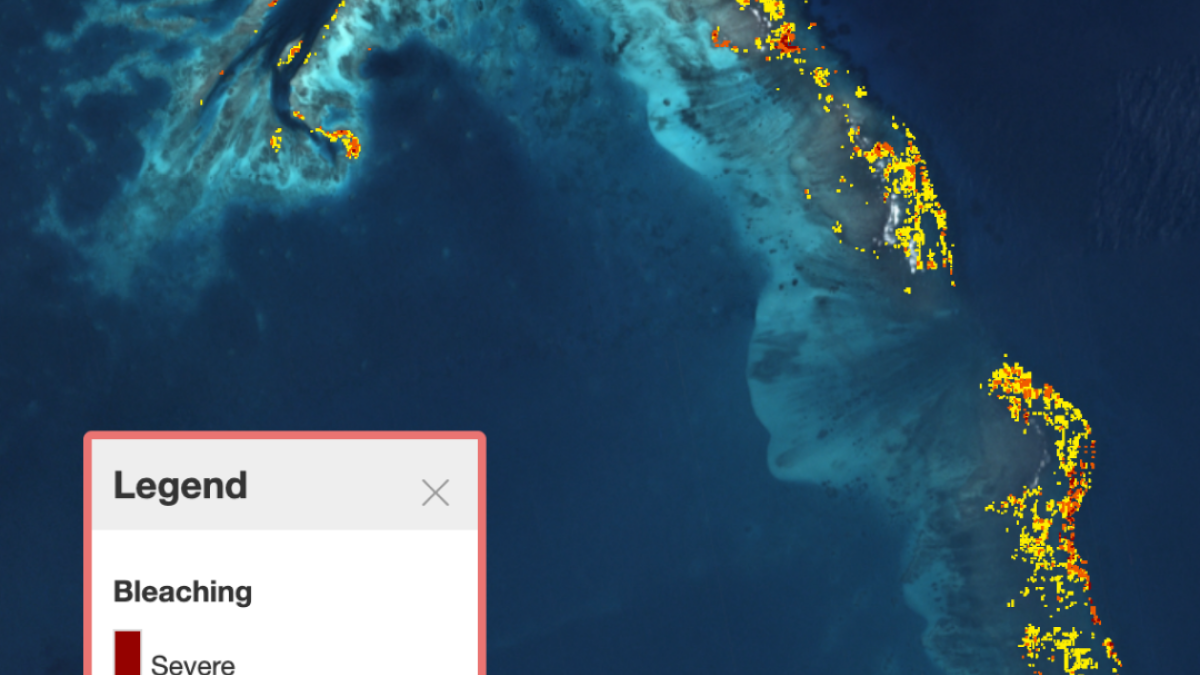ASU partners with the Commonwealth Secretariat to widen support for coral reef management

Allen Coral Atlas shows coral bleaching data in Papua New Guinea on Sept. 27, 2021.
To advance climate action and protect the world’s vital ecosystems, resources must be made accessible to those in conservation. In an effort to support expanded coral reef protection — an ecosystem integral to coastal communities and marine biodiversity — Arizona State University is partnering with the Commonwealth Secretariat to bring cutting-edge coral-mapping technology to the teams at the forefront of policy action.
Through their partnership, ASU and the Commonwealth Secretariat will provide governmental decision-makers and coastal managers with cutting-edge data from the Allen Coral Atlas: a tool mapping and monitoring the world’s tropical coral reefs in unprecedented detail, led by ASU.
The Commonwealth Secretariat is an intergovernmental organization connecting 54 Commonwealth countries in efforts to advance sustainable development, democracy and peace. In April 2018, the organization adopted the Commonwealth Blue Charter as a commitment from member countries to collaborate on ocean solutions.
“The Commonwealth is home to 45% of the world’s tropical coral reefs, which act as vital reservoirs of marine life and biodiversity, natural sea defenses, and a source of life and livelihood for millions of people. However, they are severely threatened by global warming and other human pressures.” said Paulo Kautoke, senior director for trade, oceans and natural resources at the Commonwealth Secretariat. “This initiative will provide Commonwealth countries with essential geographic data and ecosystem health information to protect and manage their coral reefs in a sustainable manner. The Commonwealth Blue Charter action groups can also facilitate learning and help member countries make the most effective use of this information.”
Earlier this year, the Allen Coral Atlas added a groundbreaking new feature to monitor coral bleaching by using satellite images to detect whitening on the seafloor. Bleaching is driven by climate change, pollution and other stressors, and it occurs when marine heat waves cause coral to expel algae and lose their color.
To push adoption of the groundbreaking tool, the Commonwealth Secretariat will soon be launching online training modules for coral managers and technicians in member countries to learn how to use the Allen Coral Atlas to map local reefs, study bleaching trends and feed this data into policy and decision-making processes.
The Commonwealth Blue Charter is implemented through 10 country-driven action groups, each led by a "champion country." Championed by Australia, Belize and Mauritius, the action group on coral reef protection and restoration include countries such as the Bahamas, Barbados, Sri Lanka, Trinidad and Tobago, and the United Kingdom.
“By partnering with the Commonwealth Secretariat, the Allen Coral Atlas will reach new countries and communities as a resource to generate and scale coral reef protection and management,” said Greg Asner, managing director of the Allen Coral Atlas and director of the Center for Global Discovery and Conservation Science at ASU. “The true impact will best be achieved as more governments and organizations implement the Atlas toolkit in pursuit of long-term reef sustainability, biodiversity protection, and the preservation of human livelihoods that depend on the world’s coral reefs.”
Since its launch in 2017, the Allen Coral Atlas has become the pre-eminent coral reef habitat dataset and is already in use by many Commonwealth countries. For example, the habitat maps were used by the Commonwealth in mid-2021 to track the enduring impacts of the MV Wakashio oil spill, which occurred in Mauritius last August, and the same maps were used by the government of Sri Lanka in 2019 to upgrade a marine protected area to a national park.
Through this partnership, the Allen Coral Atlas is positioned to be widely utilized as an integrated and comprehensive resource to protect underwater ecosystems and drive informed ocean policy.
More Science and technology

Compact X-ray laser lab aims to reveal deep secrets of life, matter and energy
X-rays allow us to view inside the human body to diagnose broken bones and other hidden problems. More recent X-ray advances are…

Apollo lunar samples enable ASU researcher to pinpoint moon’s crystallization timeline
A team of researchers, including Arizona State University geochemist Melanie Barboni, in collaboration with scientists from The…

NASA launches space telescope to chart the sky and millions of galaxies
California’s Vandenberg Space Force Base was the site for Tuesday’s 8:10 p.m. launch of the NASA SPHEREx mission aboard a SpaceX…

